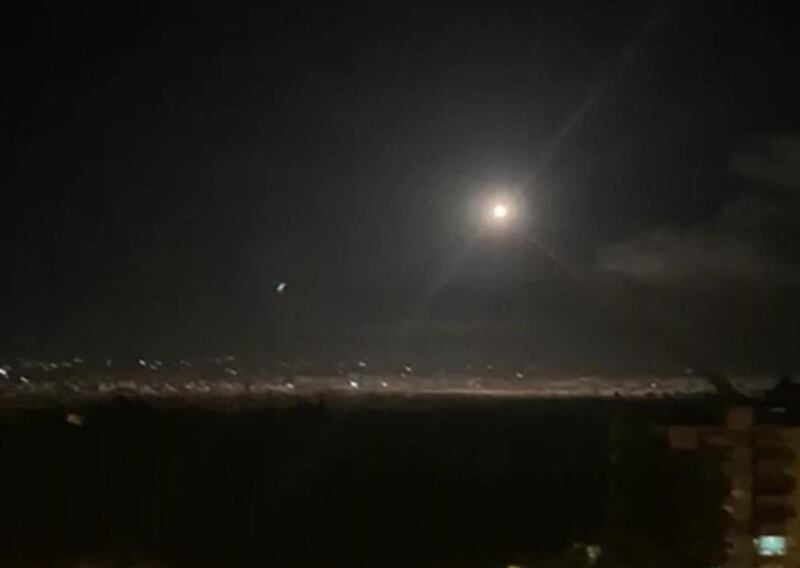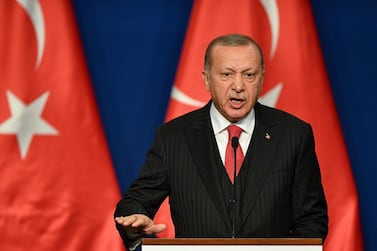Air raids in Syria, blamed on Israel, have killed at least three foreign pro-regime fighters south of the war-torn country's capital, a war monitor said on Monday.
The Britain-based Syrian Observatory for Human Rights said Sunday night's attack hit Syrian regime and Iranian positions south of Damascus.
It said three non-Syrian loyalist fighters were killed by a rocket blast between the suburb of Aqraba and the nearby Sayyida Zeinab neighbourhood, home to a shrine revered by Shiite Muslims.
It did not specify their nationality but said they were likely Iranian.
Syrian state news agency SANA reported the attack just before midnight on Sunday.
It said Syrian air defences fired on "hostile missiles" coming from "the Occupied Territories", referring to Israel.
It said one missile came down in Aqraba, southeast of Damascus.
In neighbouring Lebanon, Israeli warplanes could be heard flying in the country’s airspace at the time of the air strikes in Syria. Damascus has said in the past that Israeli warplanes have fired missiles into Syria from Lebanese airspace. Lebanese Shiite movement Hezbollah has accused Israel of flying attack drones into Beirut.
An Israeli strike on November 20 killed 21 pro-regime fighters including 16 foreigners, along with two civilians, according to the Observatory.
In July, six Iranians and three pro-regime Syrian fighters were killed in reported Israeli missile strikes in the southern provinces of Daraa and Quneitra, according to the Observatory.
A month later, the Israeli army carried out a strike in Aqraba, killing two Hezbollah and one Iranian fighter.
Israel has repeatedly struck Iran-linked targets in Syria in recent years and has warned against any permanent Iranian presence on the frontier.
Iran has forces based in Syria, Israel’s northern neighbour, and supports Hezbollah militants in Lebanon.
In November, Israel killed a senior commander of the Palestinian Islamic Jihad, an Iran-backed group in the Gaza Strip, setting off two days of heavy fighting. A separate air strike failed to kill its target of an Islamic Jihad leader in Damascus, underscoring the risk of escalation at pressure points across the volatile region.
Later in the month, Israel's military struck dozens of Iranian targets in Syria in response to rocket fire on the occupied Golan Heights, which Israel captured from Syria and occupied in 1967.
Israel rarely comments on its operations inside Syria, but it admitted that it had targeted multiple assets of Iran's elite Quds Force, including surface-to-air missiles, military bases, and weapons warehouses.
The strikes further burst into the open what has been a long shadow war between Israel and Iran.
Iran and Hezbollah are fighting on the side of President Bashar Al Assad in the Syrian war, and Israel says they are trying to turn southern Syria into a new front against Israelis. The Russian air force is helping the Syrian regime with strikes against rebels and militants, but has sought to avoid clashes and any escalation with Israel. Russian Foreign Minister Sergey Lavrov met with his Syrian counterpart Walid Muallem in Moscow on Monday.
Israel has vowed it will continue its strikes against Iranian targets trying to establish a permanent military presence there and against advanced weapons shipments to Hezbollah.
Israeli Prime Minister Benjamin Netanyahu has warned Iran that it will ramp up military action against its assets across the Middle East, and has intensely lobbied US President Donald Trump and American officials about Iran's malign activity in the region. He has also Mr Netanyahu also has claimed Iran is using Iraq and far-off Yemen, where Tehran supports Shiite Houthi rebels at war with a Saudi-led coalition backing the government, to plan attacks against Israel. Hamas also receives some support from Iran.
The war in Syria has killed more than 370,000 people and displaced millions since it began with anti-government demonstrations brutally crushed by security forces.







